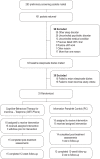Randomized controlled trial of telephone-delivered cognitive behavioral therapy for chronic insomnia
- PMID: 23450712
- PMCID: PMC3571746
- DOI: 10.5665/sleep.2448
Randomized controlled trial of telephone-delivered cognitive behavioral therapy for chronic insomnia
Abstract
Study objectives: To compare the efficacy of telephone-delivered cognitive-behavioral therapy for insomnia to an information pamphlet control on sleep and daytime functioning at pretreatment, posttreatment, and 12-wk follow-up.
Design: Randomized controlled parallel trial.
Setting: N/A.
Participants: Thirty individuals with chronic insomnia (27 women, age 39.1 ± 14.4 years, insomnia duration 8.7 ± 10.7 years).
Interventions: Cognitive behavioral therapy for insomnia (CBTI) delivered in up to eight weekly telephone sessions (CBTI-Phone, n = 15) versus an information pamphlet control (IPC, n = 15).
Measurements and results: Sleep/wake diary, sleep-related questionnaires (Insomnia Severity Index, Pittsburgh Sleep Quality Index, 16-item Dysfunctional Beliefs and Attitudes about Sleep), and daytime symptom assessments (fatigue, depression, anxiety, and quality of life) were completed at pretreatment, posttreatment, and 12-wk follow-up. Linear mixed models indicated that sleep/wake diary sleep efficiency and total sleep time improved significantly at posttreatment in both groups and remained stable at 12-wk follow-up. More CBTI-Phone than IPC patients showed posttreatment improvements in unhelpful sleep-related cognitions (P < 0.001) and were classified as "in remission" from insomnia at follow-up (P < 0.05). Posttreatment effect sizes on most daytime symptoms were large (Cohen d = 0.8-2.5) for CBTI-Phone patients and small to moderate (Cohen d = -0.1-0.6) for IPC patients. All CBTI-Phone patients completed posttreatment and 12-wk follow-up assessments, but three IPC patients discontinued the study.
Conclusions: The findings provide preliminary support for telephone-delivered CBTI in the treatment of chronic insomnia. Future larger-scale studies with more diverse samples are warranted. Some individuals with insomnia may also benefit from pamphlet-delivered CBTI with brief telephone support.
Citation: Arnedt JT; Cuddihy L; Swanson LM; Pickett S; Aikens J; Chervin RD. Randomized controlled trial of telephone-delivered cognitive behavioral therapy for chronic insomnia. SLEEP 2013;36(3):353-362.
Keywords: Cognitive behavioral therapy; insomnia; randomized controlled trial; sleep; telephone; treatment.
Figures
Comment in
-
The future of insomnia treatment--the challenge of implementation.Sleep. 2013 Mar 1;36(3):303-4. doi: 10.5665/sleep.2432. Sleep. 2013. PMID: 23450899 Free PMC article. No abstract available.
References
-
- Roth T, Coulouvrat C, Hajak G, et al. Prevalence and perceived health associated with insomnia based on DSM-IV-TR; International Statistical Classification of Diseases and Related Health Problems, Tenth Revision; and Research Diagnostic Criteria/International Classification of Sleep Disorders, Second Edition Criteria: Results from the America Insomnia Survey. Biol Psychiatry. 2011;69:592–600. - PubMed
-
- Breslau N, Roth T, Rosenthal L, Andreski P. Sleep disturbance and psychiatric disorders: a longitudinal epidemiological study of young adults. Biol Psychiatry. 1996;39:411–8. - PubMed
-
- Katz DA, McHorney CA. The relationship between insomnia and health-related quality of life in patients with chronic illness. J Fam Pract. 2002;51:229–35. - PubMed
-
- Taylor DJ, Lichstein KL, Durrence HH, Reidel BW, Bush AJ. Epidemiology of insomnia, depression, and anxiety. Sleep. 2005;28:457–64. - PubMed
-
- Taylor DJ, Mallory LJ, Lichstein KL, Durrence HH, Riedel BW, Bush AJ. Comorbidity of chronic insomnia with medical problems. Sleep. 2007;30:213–8. - PubMed
Publication types
MeSH terms
Grants and funding
LinkOut - more resources
Full Text Sources
Other Literature Sources
Medical
Miscellaneous


